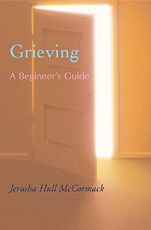The Grief Liberation Front
"In becoming bereaved, you will find you have inadvertently joined an underground organization.
"The world is full of invisible sufferers — those who have lost someone through any manner of catastrophes. They are invisible because society prefers to remain invisible. In our 'happy' society, it is simply more comfortable and convenient that we not be reminded of them.
"Nobody seeks to be a member of this club; but you had little choice in the matter. What counts now is what you are going to do about it. When you gather enough strength, it is time to assert your rights to grieve in a manner, and at a time, which is appropriate to you — and not to others who wish to control or sideline consciousness of your pain.
Your Rights as a Person in Grief
• You have a right to remain silent.
• You have a right to cry, any time and anywhere.
• You have a right to express your grief in ways that seem appropriate to you.
• You have a right to talk about your dead spouse/child/sibling/parent/friend as often as you would wish and on whatever occasions you wish to do so.
• You have a right to negotiate for time out from the usual schedules and obligations, so that you may honor your grief — and heal.
• You have a right to complete your grieving in your own time and in your own way, without being subject to the 'schedules' and expectations of others.
• You have a right to assert the centrality of the experience of grieving, within your own life and as it affects the lives of others.
Educating Others to Grief
The grieving are burdened by duties. They must discharge their responsibilities to the deceased, by arranging a funeral, a burial place, a gravestone. They must discharge their responsibilities to all the other people involved, from family to friends and colleagues. And often they must deal with the terrible burden of continuing alone, to raise children who are themselves stricken by grief, or to console siblings or parents or others who loved the person who died, and to endure a new life without the support of the person they have loved and lost.
"On top of this, there is the endless succession of dry official letters and arid meetings with lawyers and other experts, as the estate is settled, and perhaps the house sold, and all the other practical arrangements are made for the things that the deceased has left undone, or left behind.
"But perhaps the greatest burden that the grieving carry is that of educating others to the meaning of grief — which is nothing less than educating them to the meaning of their own eventual death.
"It is a thankless task, and not one that any individual in grief would willingly assume. But it is thrust upon us by the fact that others simply do not understand or do not care to understand what those who are grieving are going through. On the shoulders of mourners falls the task of integrating the dead into the society of the living. You are now the one who understands how we die with the dead and how they are born again through us. Given the modern degradation of what grieving involves, it is now up to you to impress on others how absorbing, how passionate, how life-transforming this experience can be.
"You need not seek opportunities to do this; they will happen. But you can help the process along by taking it on yourself to practice a bare honesty, not to accept false comfort, to correct firmly and openly misconceptions about your present state. Say what needs to be said and no more. If you know you are going against the expectations of others in any given situation, you might wish to explain why you are doing so. The only thing others have to know is that what you are going through is important and that you are doing it your way and in your own time.
"In fact, sometimes the most important thing you can do right now is just cry. Do not be afraid of embarrassing others. If you burst into tears, you burst into tears; allow yourself to cry when and where you feel like it, without any added sense of humiliation. You are not letting anyone down; you are in grief; you have a right to cry. Make others acknowledge it. Do not add guilt about your own pain to your already terrible burdens.
"Every loss is unique. Each person grieves in his or her own way. Perhaps nothing draws as deeply on individual creativity as grief does. It is a time to rally your own resources, to use them in such a way as to express your grieving as your own, and thus to take possession to it."
